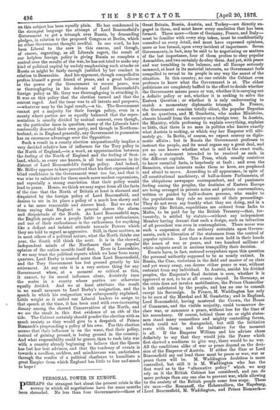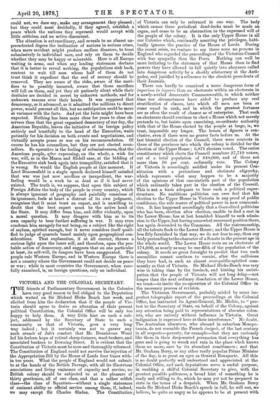has an enormous advantage over the Opposition. mately go. In
Berlin, of course, we expect secrecy on diplo- first word as to the "alternative policy" which -we may rely on it the British Cabinet has considered, and can .do
could not, we dare say, make any arrangement they pleased ; but they could most decidedly, if they agreed, establish a peace which the nations they represent would accept with little criticism and no active discontent.
The situation is extraordinary, and reveals to an almost un- precedented degree the inclination of nations in serious crises, when mere accident might produce endless disasters, to trust submissively in individual men, and rely on them to decide whether they may be happy or miserable. Here is all Europe waiting in arms, and when any leading statesman declares that it is better to reveal nothing, the populations sink back, content to wait till men whom half of them do not trust think it expedient that the seal of secrecy should be removed. They are aware of the risks, aware of the sacri- fices to be possibly incurred, aware that those sacrifices will fall on them, and yet they sit patiently silent while their destinies are decided in secret by unknown methods, and for unknown reasons over their heads. It was supposed that democracy, as it advanced, as it admitted the millions to direct power, would prevent all this, but no anticipation could be more at variance with the facts. And yet the facts might have been expected. Nothing has been more clear for years to close ob- servers than that the great organised democracy of our day, the American Republic, leaves the initiative of its foreign policy entirely and trustfully to the head of the Executive, waits patiently for his decision on both events and negotiations, and virtually accepts peace or war on his recommendation. Of course he has his counsellors, but they are not elected coun- sellors. So operative is the feeling of submissiveness, that the American people, after expressing, on the whole, a wish for war, will, as in the Mason and Slidell case, at the bidding of the Executive sink back again into tranquillity, satisfied that it is wrong. So would the English people at this moment. If Lord Beaconsfield in a single speech declared himself satisfied that war was just now needless or inexpedient, the war- feeling would in a week be as dead as if it had never existed. The truth is, we suppose, that upon this subject of Foreign Affairs the body of the people in every country, which is always ignorant of geography and painfully conscious of its ignorance, feels at heart a distrust of its own judgment, recognises that it must trust an expert, and is unwilling to doubt that the best expert must be the active head of the State. It may differ from him, and differ violently, upon a moral question. It may disagree with him as to its own capacity to bear further suffering in war. It may even condemn him savagely for not being, on a subject like the right of asylum, spirited enough, but it never considers itself quali- fied to judge of quarrels based mainly upon geographical con- siderations. That explanation, if at all correct, throws a curious light upon the inner self, and therefore, upon the pro- bable action of democracy, and suggests that on one particular at least, its self-will, its dangers have been exaggerated. The people rule Western Europe, and in Western Europe there is not a country where the Government could not decide on peace or war ; while in most countries the Government, when care- fully examined, is, on foreign questions, only an individual.



































 Previous page
Previous page